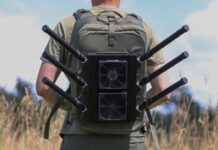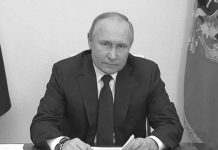WASHINGTON – NEWS – For some Florida Guardsmen, leaving the troops they were training with in Yavoriv, Ukraine, was of one of the toughest moments of their military careers.
“Walking over to the Ukrainians and telling them we were leaving was painful,” Army Col. Blake Glass, commander of the 53rd Infantry Brigade Combat Team, Florida National Guard, said. “We are personally invested; these are our friends and partners.”
But — as Army Gen. Daniel R. Hokanson, chief of the National Guard Bureau, saw during a recent visit here — the Soldiers of the 53rd IBCT found renewed purpose after reuniting with their Ukrainian partners in Germany.
“Training with them again is a great way for us to stay involved,” Glass said.
The 53rd IBCT deployed about 150 Soldiers last November for what they thought would be a longer rotation training with the Armed Forces of Ukraine.
For four months, the Florida Guardsmen worked alongside AFU members to build defense capacity. But in February, as an unprovoked Russian invasion loomed, the soldiers were ordered to evacuate.
Among the last U.S. service members to leave, the soldiers of the 53rd IBCT shared hugs and sorrowful goodbyes with their Ukrainian counterparts.
Now, the 53rd IBCT — known as Task Force Gator — is assisting Ukraine troops who have come to Grafenwoehr, Germany, to train. Many of whom have since returned to the fight.
Grafenwoehr is the largest overseas U.S. military installation and home to 7th Army Training Command. There, the 53rd IBCT is working to provide continued logistics and training support as part of Joint Multinational Training Group-Ukraine.
“You are here to provide the support and training they need to continue fighting for their independence and their country’s sovereignty,” Hokanson told a formation of Task Force Gator soldiers. “I can’t thank you enough for providing that enduring support.”
Assistance begins with providing immediate support to AFU members fresh off the frontlines: addressing medical issues, and providing clean beds and linens, boots and clothing. A Florida Guard chaplain and mental health counselor are also available to provide support to AFU members who have experienced trauma and lost family members and friends.
A larger part of U.S. support enhances AFU lethality by increasing its soldiers’ familiarity with the weapons being delivered to Ukraine.
The Florida Guard and the 7th ATC, among others, have trained about 1,000 AFU members on weapon systems, including artillery such as the 155mm Howitzer, Glass said.
“We know when Ukrainian soldiers come through here they have a responsibility to train and get back as soon as they can,” Glass said. “We want to take care of every one of their needs to ensure they can do just that.”
Hokanson met with AFU members as a multi-component, multinational mix of personnel had just returned from live-fire training and were reorganizing for the next iteration of drills.
“I was impressed with the urgency of their training,” Hokanson said. “It is highly focused. The Ukrainians are adept, capable and motivated.”
He noted a potential challenge for Ukrainian soldiers: reading dials, instrument panels and digital screens featuring English text. While some AFU soldiers know the language, others do not. But that hasn’t been a roadblock, Glass said.
“The help and training we’re providing are a direct correlation to the success they’re having,” he said. “They have our numbers on speed dial. We can hear the guns firing while we’re working through issues with them on the phone.”
Many states’ National Guards have built a close connection with Ukraine through the Defense Department’s National Guard State Partnership Program. This Florida Guard unit is the eleventh National Guard element to rotate through JMTG-U since it was established in 2015. Soon, another unit will replace them.
“The National Guard and its State Partnership Program has been instrumental by providing that connective tissue throughout Europe to build and enable partner capacity, readiness and interoperability,” said Army Brig. Gen. Joseph Hilbert, commanding general of the 7th ATC.
The National Guard has been building security partnerships for almost 30 years through the SPP, and the program now includes 93 nations around the globe. The SPP’s value cannot be overstated, Hokanson said.
Germany was Hokanson’s second stop on a five-nation trip to recognize and strengthen National Guard relationships with NATO allies and European partners.
“When Russia invaded, Ukraine’s military leaders reached out to people they trusted — people they had known for years — and those were members of the National Guard,” he said. “Ukrainians’ first text messages were, ‘We’re being invaded.’ Their second messages said, ‘Here’s what we need. …'”







